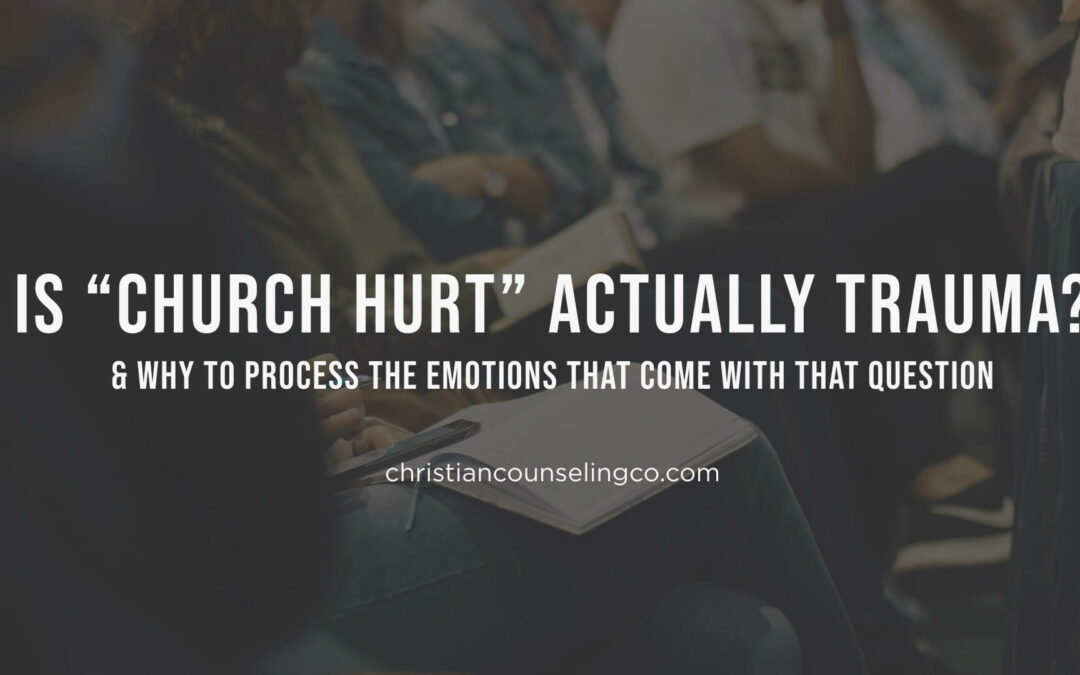“Church Hurt” is a dark corner of the Christian-world that isn’t addressed publicly too often, but so many of us have experienced pain in the context of a local church. My wife and I have such a story.
Both of us grew up attending church services multiple times a week–the summer BBQs, the children’s Sunday morning ministries, attending church three times a week, we lived life at the local church.
Nodding to our younger selves, we lived life at our local church as adults as well. We became members of a thriving church that was growing in size and influence. As we served and attended, all of our community and friendships were formed at this dear place.
However, my wife and I found ourselves entering a new type of relationship with the church in 2017. After experiencing a change in leadership, we began to feel as if the new direction of the church was becoming legalistic and focused on behavior modification. This caused sleepless nights and long conversations about what we should do! As a result, our passion for following God waned and our souls felt drained.
This wasn’t how we typically felt leaving church services in the past. We began to reckon with our frustrations and disappointments. We questioned ourselves and our motivations extensively. “Maybe we’re just being too hard on the leadership? Maybe we should leave? Is it even ok to be asking ourselves these questions?” Etc. Etc. Etc…
When other friends shared our concerns (which was validating in its own right), we decided to actively do something about it: leave our church home. After making the very difficult and not-to-mention painful decision, our church community began to raise accusations.
“You’re taking the easy way out,”
The words cut me like a knife. Whatever vague sense of clarity we had recently gained was thrown again into question. I’m not sure I’ve ever felt more hurt. Unfortunately, that message still weighs on me today and had an enduring, negative influence in my life.
Perhaps you’ve been through something like this yourself. Maybe you’re reading this right now and feeling a familiar and confusing sting of pain. If so, this blog is for you.
Is “Church Hurt” Actually trauma?
In the years since having left that church, I’ve found healing through Dr. Siegel’s words: “name it to tame it.” With both my personal life and with clients, I take the approach that if we can put a name to what happened, then we can work towards healing.
As a counselor myself, I’ve had to “name” what it was and not use “acceptable” language in the Christian world. Some will call it “church hurt.” Some will call it “spiritual abuse.” I encourage you to choose your words carefully here. Because I believe that in many of our experiences, we’re talking about trauma.
For many of us, the word trauma evokes a strong response. Isn’t trauma typically reserved for those who have experienced significant pain through sexual abuse or some other type of undeniable misery (like surviving 9/11 or living through a natural disaster)? Dr. Francine Shapiro (the founder of EMDR) offers this clarifying remark: “Any event that has had a lasting negative effect on the self or psyche is by its nature ‘traumatic.’”
It’s important to process Emotions when dealing with church hurt:
Choosing to name my experience “trauma,” allowed me to sit in the necessity of acknowledging my enduring feelings about our exit. Some emotions have felt normal to accept (like confusion, guilt, or shame), while others have felt inappropriate or even wrong (like anger, rage, or resentment).
Often, we place an unhelpful pressure on ourselves to arrive at forgiveness
sooner than we’re ready for it.
Don’t get me wrong, I hope both you and I are able to experience forgiveness in the fullest sense. However, we first need to acknowledge and reckon with the anger, disenchantment, and shame that might accompany a church-hurt related trauma. It’s in the owning of our feelings that freedom can be possible.
Obviously, there’s much more to be said on this topic. For now, let’s recall the wisdom from Richard Schwartz (founder of Internal Family Systems — a favorite counseling approach from your friendly neighborhood Cornerstone clinicians) in regards to our vulnerable pain:
“We help [the vulnerable parts of ourselves] by witnessing the bad things that happened and caused them to believe they were bad.”
Schwartz says that recognizing that something bad happened to us allows us to start moving from a space of shame to a place of feeling loved, understood, and accepted. It is then that we can begin to marinate in the freedom of loving and forgiving others.
If you’re reading this blog from a place of trying to understand your own church-hurt, church trauma, or spiritual abuse, our team at Cornerstone would be honored to come alongside you. Many of our team members list “church hurt” as a speciality in their bios and have a passion for helping people process their emotions and heal from a hard experience in the church. I would encourage you to seek counseling (here or elsewhere) to work through church hurt.
Author: lance hill
Lance is one of our talented counselors who loves working with individuals seeking freedom. He has a passion for working with those in church leadership or processing church related traumas.
If you’re interested in counseling with Lance or another one of our other amazing counselors, click here to view our line-up.



